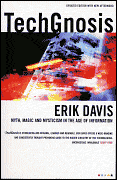
We typically think of technology as belonging entirely in the realm of rationalism, functioning with the precise mechanics and mathematical logic; mindlessly performing repetitive tasks for its human creators. In TechGnosis, Erik Davis argues instead that our use of technology has generated a whole new paradigm of myths and mysticism. Furthermore, this techgnotic paradigm fascinates the popular imagination despite our supposedly secular, rationalist, post-Enlightenment age. TechGnosis is an exploration of how this peculiar paradox has come about. When Davis refers to the mysticism of technology, however, he doesn’t simply mean the last 20 years since the advent of the personal computer. His book leaps between different historical points, from the origin of writing to Edison’s experiments with electricity through to the birth of the Internet, demonstrating that culture and technology are not actually separate beasts at all. Davis argues that technology is not simply an extension of ourselves designed to perform mundane routines. Instead, technology has a transformative effect not only on our environment but on the ways that we think about and conceive the world. Where the myth and mysticism of technology arises is within the undeniable fact that the introduction of any new technology always produces unforeseen side effects and consequences, whether it is a lunar calendar carved upon a staff, or voice-recognition software. This is especially true of this century where the complexity of technology has begun to outstrip our ability to completely comprehend it. Few of us know how a computer or a television actually works - it is enough for us to simply use it. The negative aspect of its complexity, however, is the mythical attributions that come to surround technology, ranging from the fear of the Internet as a corrupting influence and the Y2K problem all the way through to Big Brother surveillance paranoia, government conspiracy theories. Davis deftly moves through a superbly eclectic collection of sources, calling upon the great technological inventions and inventors of the ages as well as such figures as G.I. Gurdjieff and Pierre Teilhard de Chardin. Throughout TechGnosis, he argues that technology isn’t some neutral tool that we create, but rather a force as strange and difficult to comprehend as humans themselves. TechGnosis is by no means anti-technology. Davis’ playful prose crackles with energy and enthusiasm as he maps the mythos of technology. In doing so, he articulates common conceptions of technology that have remained hidden and opens up new ways of considering the impact of technology within our lives. I would be lying if I said TechGnosis was an easy read. It is packed with facts, theories and philosophical musings upon the apparent 'no-mans land' that is the juncture between technology and the metaphysical/religious. The amount of information in this book, and the consequent consideration and extrapolation required to interpret it leaves you musing for a number of weeks after finishing the book. Perhaps one of the most engaging aspects of his historical retrospective (and one that serves as the basis for his discourse) was his treatment of the myth concerning the Egyptian god [2], Thoth and King Thamus (as told by Socrates). Thoth offers a revolutionary 'techne' to the king: writing. The promise given by Thoth is not only will it "...augment memory, but amplify wisdom as well." Yet, after carefully considering the offer, the king refuses! A conclusion arrived at by Plato and countless thousands since is that "Technologies extend out creative powers by amputating our natural ones." It is this pre/post modern retrospective Davis brings to language and the technology of writing, the capacity to capture and express thoughts, images, ideas and passions. He follows its historical evolution to its present iteration, the ever pervasive internet. He also considers its future and the ramifications only just now being expressed. Essentially, he maintains, we have always been mystics. The golden age of modernity threatened to remove us from the miracle of existence. We built a wall between culture and nature. But, as the last sentence of TechGnosis reads: "Prometheus is hell–bent in the cockpit, but Hermes has snuck into Mission Control, and the matrix is ablaze with entangling tongues." Our psyche has found a hole, and that hole is the magical, mystical, technological medium of the word in cyberspace. ~review by Lisa Mc SherryAuthor: Erik Davis
